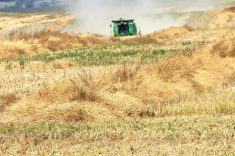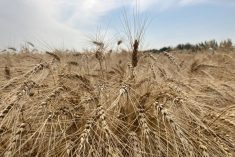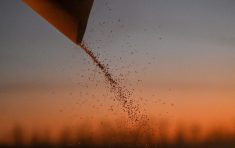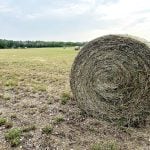MarketsFarm — Sunflower seed has found itself caught up with the general strength seen in most agricultural markets, with the Russian invasion of Ukraine adding another layer of uncertainty to the market as the two countries are both major world producers.
“We believe sunflowers are a very attractive option going into 2022,” said Robert Deraas, general manager with Scoular, which runs sunflower processing facilities in both Manitoba and Minnesota.
Sunflowers are a niche crop, he added, noting a sizeable percentage increase in planted area wouldn’t necessarily result in a significant increase in total acres.
Read Also

Alberta harvest wrapping up: report
Harvest operations advanced to 96 per cent complete in Alberta as of Oct. 7, with only a few late-seeded cereal and canola fields remaining, according to the latest provincial crop report.
Early estimates from Agriculture and Agri-Food Canada see planted sunflower area in the country holding relatively steady on the year, at just under 100,000 acres. Farmers in the U.S. seeded about 1.2 million acres of sunflowers in 2021, with the prospective plantings report on 2022 estimates due out at the end of May.
Daily market commentary compiled by the North Dakota-based National Sunflower Association shows current oilseed sunflowers trading around US$32-$33.50 per hundredweight, roughly US$10/cwt above bids at the same time a year ago.
In addition to solid prices, sunflowers on both sides of the border did reasonably well in 2021 despite hot and dry conditions, which should encourage plantings in 2022.
“There is optimism that the demand will continue to stay strong going through the 2022 harvest and the shipment of the 2022 crop,” Deraas said.
The Russian invasion of Ukraine has also been felt in sunflowers. “Traders are worried that the invasion will impact crop movement and trigger a mass scramble by importers to seek alternative shipments,” the National Sunflower Association said.
“The U.S. and Canada stand to gain from the Black Sea trade disruptions so look for volatile markets in the days ahead,” the association added in its daily report.
“Ukraine and Russia are No. 1 and No. 2 in the world, both in sunflower acres and the export of sunflower oil,” said Deraas. How the conflict will influence the demand for sunflower oil remains to be seen, with some Ukraine/Russia customers switching to alternative oils and others looking for other sources.
The U.S., Canada and Argentina are the other major sunflower-producing nations that could see more demand if Black Sea exports are hampered.
— Phil Franz-Warkentin reports for MarketsFarm from Winnipeg.

















